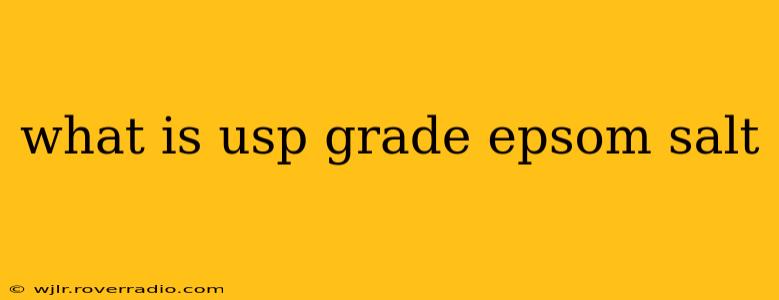Epsom salt, chemically known as magnesium sulfate (MgSO₄), is a naturally occurring mineral compound with a wide range of uses, from bath additives to gardening aids. But what does "USP Grade" mean, and why is it important? This article delves into the specifics of USP grade Epsom salt, explaining its purity, applications, and why it's preferred for certain uses over other grades.
What Does "USP" Stand For?
USP stands for United States Pharmacopeia. The USP is a non-profit organization that sets quality standards for medicines, dietary supplements, and food ingredients. A USP grade designation means that the Epsom salt meets stringent purity and quality standards established by the USP. These standards ensure the product is free from harmful contaminants and consistent in its composition. This is crucial for applications where purity is paramount, such as in medicinal or cosmetic uses.
What Makes USP Grade Epsom Salt Different?
The key difference between USP grade Epsom salt and other grades lies in its purity. While other grades might contain trace amounts of impurities or other minerals, USP grade Epsom salt undergoes rigorous testing and purification processes to ensure it meets the USP's exacting specifications. This means it's:
- Highly pure: Free from significant levels of contaminants that could be harmful or affect its efficacy.
- Consistent: The composition is reliably the same from batch to batch, ensuring consistent results in various applications.
- Safe for ingestion (with proper medical guidance): While not typically ingested without medical advice, its USP grade ensures it's safe for internal use under the supervision of a healthcare professional.
What Are the Common Applications of USP Grade Epsom Salt?
The high purity of USP grade Epsom salt makes it suitable for a variety of applications, including:
- Medicinal uses: While always consulting a doctor is vital, some people use USP grade Epsom salt for its potential magnesium content (though oral absorption can be limited). It’s sometimes used as a laxative, though other options are generally preferred. It's also used topically for its soothing properties on skin.
- Cosmetic applications: Its purity makes it suitable for inclusion in bath salts, foot soaks, and other cosmetic products, reducing the risk of skin irritation from impurities.
- Gardening: While not strictly necessary for gardening, the high purity ensures it won't introduce unwanted chemicals to plants.
Is USP Grade Epsom Salt More Expensive?
Yes, USP grade Epsom salt is typically more expensive than other grades. This is because the rigorous testing and purification processes involved in meeting USP standards add to the manufacturing costs.
Is USP Grade Epsom Salt Necessary for All Applications?
Not necessarily. For applications like gardening or simple bath soaks, a lower grade of Epsom salt might suffice. However, for uses where purity is critical, such as in medicinal preparations or cosmetic products designed for sensitive skin, USP grade is strongly recommended to minimize the risk of adverse effects.
How Can I Identify USP Grade Epsom Salt?
Look for the USP designation clearly marked on the product label. Reputable manufacturers will prominently display this information to assure customers of its quality.
What are the potential side effects of using Epsom salt?
While generally safe when used externally, Epsom salts can cause skin irritation in some individuals. Ingesting Epsom salts can lead to diarrhea, nausea, and stomach cramps. Always consult a healthcare professional before using Epsom salts internally.
By understanding the significance of USP grade Epsom salt, consumers can make informed choices based on their specific needs and ensure they are using a high-quality product for their intended application. Remember that consulting a healthcare professional is crucial before using Epsom salts for medicinal purposes.
